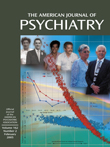Sex Differences in the Relationship Between Social Support and Risk for Major Depression: A Longitudinal Study of Opposite-Sex Twin Pairs
Abstract
OBJECTIVE: Compared to men, women have larger and more intimate social networks and higher rates of major depression. Prior studies have suggested that women are more sensitive to the depressogenic effects of low social support, but most of these studies had substantial methodologic limitations. METHOD: In two interview waves at least 1 year apart, 1,057 pairs of opposite-sex dizygotic twin pairs ascertained from a population-based register were assessed. The authors predicted risk of major depression in the year before the wave 2 interview from levels of social support assessed at wave 1. RESULTS: Women reported higher levels of global social support than their twin brothers. Global social support at wave 1 predicted risk for major depression at wave 2 significantly more strongly in female than in male members of these pairs, and the same effect was seen when the analysis controlled for the history of major depression in the year prior to wave 1. Women were more sensitive than men to the depressogenic effects of low levels of social support, particularly from the co-twin, other relatives, parents, and spouses. Levels of social support did not explain the sex difference in risk for major depression. CONCLUSIONS: Emotionally supportive social relationships are substantially more protective against major depression for women than for men. While these effects cannot explain sex effects on the prevalence of major depression, they do suggest important sex differences in pathways of risk. Clarification of the nature of the causal links between low social support and depression in women is needed.



